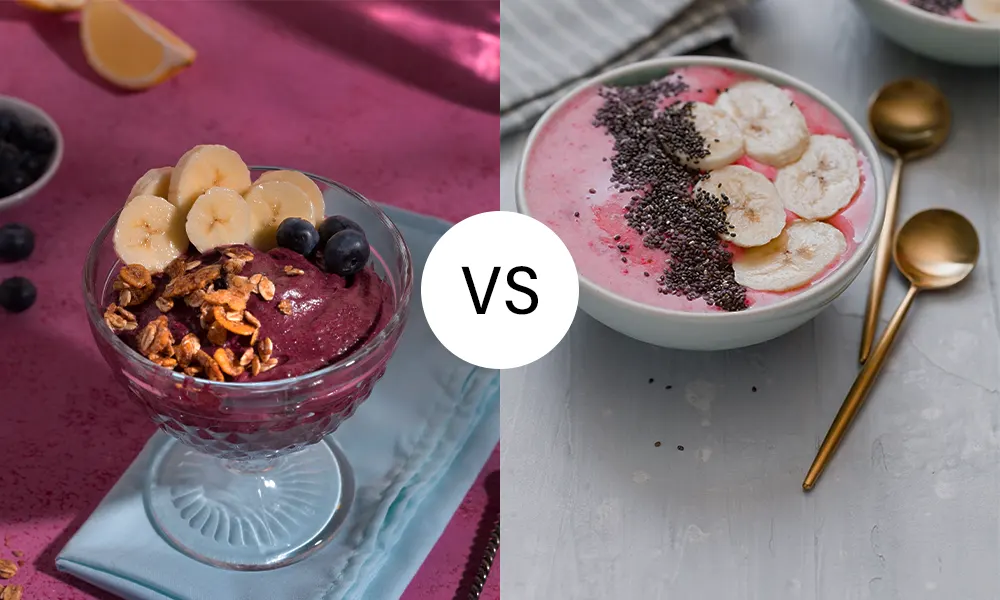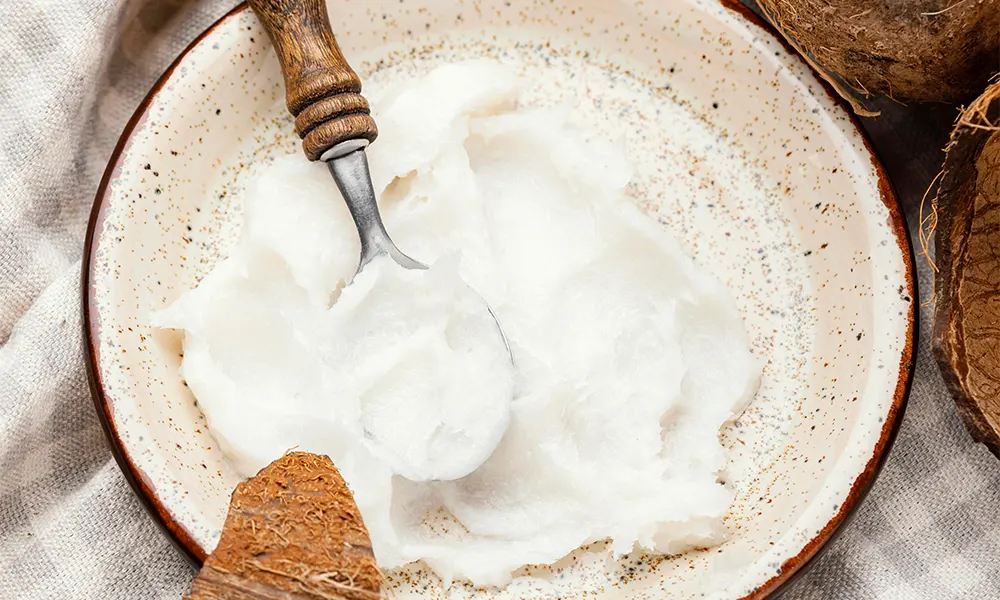yogurt has recently become a staple in many diets, celebrated for its creamy texture and health benefits. With the rise of plant-based diets and lactose intolerance awareness, the market has seen a surge in alternative yogurts. Coconut yogurt and vegan yogurt have gained significant popularity. But what sets them apart?
Understanding the differences between coconut yogurt and vegan yogurt is essential for making informed dietary choices. Whether you’re seeking a dairy-free option, aiming to boost your nutritional intake, or simply exploring new flavours, knowing the nuances can enhance your eating experience.
This blog delves into the distinct characteristics of coconut yogurt and vegan yogurt, exploring their ingredients, health benefits, taste profiles, and more. By the end, you’ll clearly understand which yogurt aligns best with your lifestyle and preferences.
What is Coconut yogurt?
Coconut yogurt is a dairy-free alternative made primarily from coconut milk. It leverages the rich, creamy texture of coconuts to mimic the consistency of traditional yogurt. Typically, it involves fermenting coconut milk with live cultures, similar to how dairy yogurt is produced.
One of the standout features of coconut yogurt is its natural sweetness and tropical flavour. It’s an excellent choice for those who enjoy the distinct taste of coconut and are looking for a dairy-free option. Additionally, coconut yogurt often contains healthy fats from coconuts, contributing to its creamy mouthfeel and offering potential health benefits.
What is Vegan yogurt?
Vegan yogurt encompasses a broad category of plant-based yogurts that exclude all animal products. Unlike coconut yogurt, which is specific to coconut milk, vegan yogurt can be made from a variety of plant-based milks, including almond, soy, oat, and cashew. The versatility in base ingredients allows for a wide range of flavours and textures.
The production process of vegan yogurt involves fermenting plant-based milk with live cultures, just like traditional yogurt. This results in a probiotic-rich product that supports gut health. Vegan yogurts are favoured by vegans and those with lactose intolerance or dairy allergies, offering a nutritious and ethical alternative to dairy yogurt.
Coconut yogurt and Vegan yogurt – Are They Not the Same?
While all coconut yogurts fall under the umbrella of vegan yogurts, not all vegan yogurts are coconut-based. Vegan yogurt is a broader category that includes a variety of plant-based alternatives, each with its unique characteristics and flavour profiles. Coconut yogurt specifically uses coconut milk as its base, providing a distinct taste and texture that differs from other vegan options.
Moreover, the nutritional content can vary significantly between coconut yogurt and other vegan yogurts. For instance, coconut yogurt is typically higher in saturated fats due to the nature of coconut milk. In contrast, other vegan yogurts might offer different nutritional benefits, such as higher protein content from soy-based yogurts.
Understanding these distinctions is crucial for consumers aiming to meet specific dietary needs or preferences. Whether it’s the flavour, nutritional profile, or texture, knowing that coconut and vegan yogurt are not synonymous helps make better-informed choices.
Coconut yogurt vs. Vegan yogurt – Key Differences
When comparing coconut yogurt and vegan yogurt, several key differences emerge. These differences span various aspects, including ingredients, nutritional content, taste, texture, and more. Below are the primary distinctions to consider:
1. Base Ingredients
Coconut yogurt is exclusively made from coconut milk, leveraging coconuts’ natural fats and flavours. In contrast, vegan yogurt can be made from a variety of plant-based milks, such as almond, soy, oat, cashew, and more. This diversity in base ingredients allows for various flavours and textures in vegan yogurts.
2. Nutritional Profile
The nutritional content varies between coconut yogurt and other vegan yogurts. Coconut yogurt tends to be higher in saturated fats due to the coconut milk, which can benefit those seeking healthy fats but may be a concern for others. Vegan yogurts made from soy or almond milk often provide higher protein content and lower fat levels, catering to different dietary needs.
3. Flavor and Taste
Coconut yogurt offers a distinct tropical flavour that is rich and sweet, making it a favourite for those who enjoy coconut’s unique taste. Depending on their base, vegan yogurts can range from nutty flavours like almond to mild and creamy tastes like soy or oat, providing a broader palette of flavour options.
4. Texture and Consistency
The creamy texture of coconut yogurt is a hallmark, offering a luscious mouthfeel that’s comparable to traditional dairy yogurt. Other vegan yogurts can vary significantly in texture; for example, almond yogurt might be thinner, while cashew yogurt can be equally creamy. The choice for consistency depends on personal preference.
5. Probiotic Content
Both coconut yogurt and vegan yogurts can be rich in probiotics, which are essential for gut health. However, the probiotic strains and their viability might differ based on the fermentation process and the base ingredients used. It’s important to check labels for specific probiotic information.
6. Sweeteners and Additives
Coconut yogurt often contains natural sweeteners to enhance its flavour, while vegan yogurts might use a variety of sweeteners or even be unsweetened. Some vegan yogurts include thickeners and stabilisers to achieve the desired texture, which can vary between brands and types.
7. Allergen Considerations
Coconut yogurt is free from common allergens like soy and nuts, making it suitable for those with specific allergies. Conversely, vegan yogurts made from nuts or soy may not be suitable for individuals with allergies to these ingredients, highlighting the importance of ingredient awareness.
8. Environmental Impact
The environmental footprint of coconut yogurt versus other vegan yogurts can differ based on the sustainability of the base ingredients. Coconut farming has its environmental considerations, such as land use and biodiversity, while other plant-based milks like oat or soy may have different impacts, influencing eco-conscious consumers’ choices.
Health Benefits of Coconut yogurt
Coconut yogurt isn’t just a delicious alternative to dairy; it also offers several health benefits that make it a valuable addition to your diet. Here are five key health benefits of incorporating coconut yogurt into your meals:
1. Rich in Medium-Chain Triglycerides (MCTs)
Coconut yogurt is a great source of medium-chain triglycerides (MCTs), a type of healthy fat that is easily digested and quickly converted into energy by the body.
Unlike long-chain fatty acids found in many other foods, MCTs are metabolised directly in the liver. They provide a rapid energy source and potentially aid in weight management. This makes coconut yogurt an excellent choice for those looking to boost their energy levels and support a healthy metabolism.
2. Promotes Digestive Health
The probiotics present in coconut yogurt play a crucial role in maintaining a healthy digestive system. These beneficial bacteria help balance the gut microbiome, improving digestion and enhancing nutrient absorption.
Regularly consuming probiotic-rich foods like coconut yogurt can help prevent digestive issues such as bloating, constipation, and irritable bowel syndrome (IBS), contributing to overall gut health and comfort.
3. Supports Immune Function
The probiotics and nutrients in coconut yogurt also support the immune system. A healthy gut microbiome is closely linked to a strong immune response, as it helps the body fend off pathogens and reduces inflammation.
Additionally, coconut yogurt contains vitamins and minerals like vitamin C and iron, which are essential for maintaining a robust immune system and protecting the body against infections and illnesses.
4. Gluten-free and Allergy-Friendly
Coconut yogurt is naturally gluten-free and free from common allergens like dairy, soy, and nuts, making it an ideal choice for individuals with dietary restrictions or food sensitivities. This ensures that those with celiac disease, lactose intolerance, or specific food allergies can enjoy a nutritious and safe yogurt alternative without compromising on taste or texture.
5. Antioxidant-Rich
Coconut yogurt contains antioxidants that help protect the body from oxidative stress and free radical damage.
These antioxidants are vital in preventing cellular damage, reducing inflammation, and lowering the risk of chronic diseases such as heart disease, diabetes, and certain cancers.
At Yohayo, we recognise the diverse needs of our customers and strive to provide high-quality frozen yogurts that cater to all tastes. Our frozen yogurts are freshly made and packed with nutrients and flavour.
Conclusion
When choosing between coconut yogurt and vegan yogurt, consider your personal preferences and dietary requirements. Both types offer unique flavours and nutritional benefits, making them excellent alternatives to traditional dairy yogurt.
Whether you’re looking for the tropical taste of coconut or the versatility of various plant-based milks, there’s a yogurt option to suit your lifestyle.
Our vanilla coconut yogurt stands out as a favourite. It combines the rich creaminess of coconut with the smooth sweetness of vanilla. This delicious blend satisfies your taste buds and ensures you’re getting a nutritious, dairy-free option that fits seamlessly into your diet.
Experience the exceptional quality of Yohayo’s frozen yogurt by trying our vanilla coconut yogurt today. Contact us or visit your local store in Melbourne to discover our full range of flavours. Treat yourself to a healthier, tastier alternative that brings joy to every spoonful!
FAQs
1. Is coconut yogurt suitable for people with nut allergies?
Yes, coconut yogurt is typically free from nuts, making it a safe option for those with nut allergies. However, always check labels to ensure no cross-contamination.
2. Which yogurt has more protein, coconut or vegan?
Generally, vegan yogurts made from soy or pea protein have higher protein content than coconut yogurt, which is lower in protein.
3. Can coconut yogurt be used in cooking and baking?
Absolutely. Coconut yogurt can be used as a substitute for dairy yogurt in various recipes, adding a rich, creamy texture and a hint of coconut flavour.
4. Are there sugar-free options available for both yogurts?
Yes, both coconut yogurt and vegan yogurt are available in sugar-free versions. If you’re monitoring your sugar intake, it’s important to read labels to choose unsweetened varieties.
5. How long does coconut yogurt last compared to vegan yogurt?
Coconut yogurt and other vegan yogurts typically have similar shelf lives. When refrigerated, they last about 1-2 weeks. Always check the expiration date on the packaging for the most accurate information.





